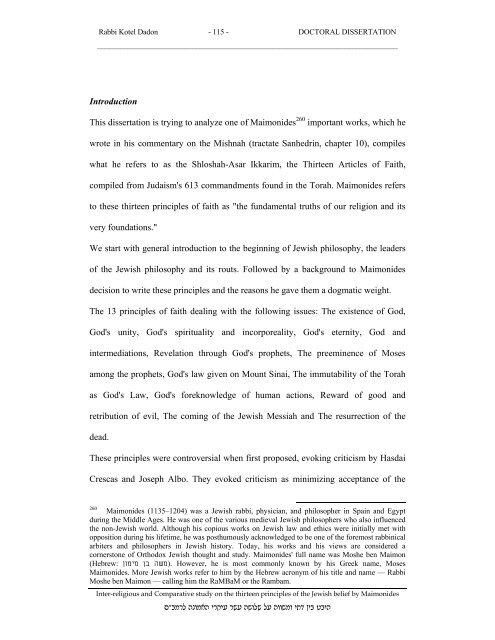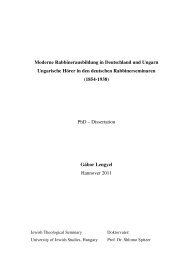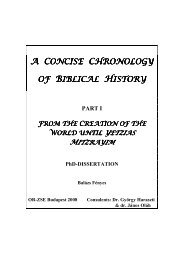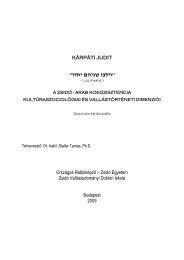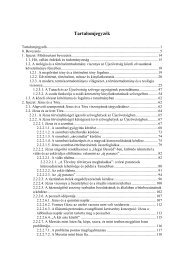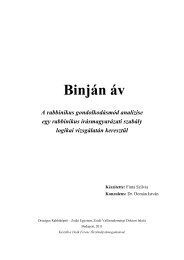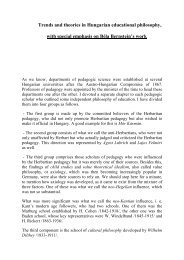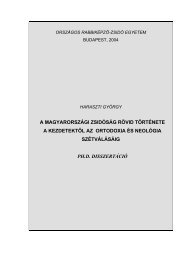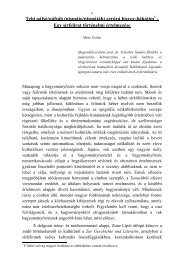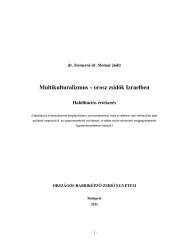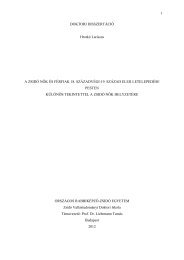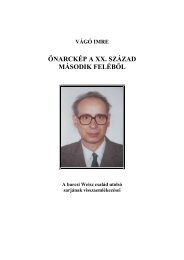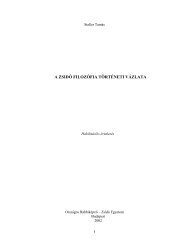DOCTORAL DISSERTATION - Or-Zse
DOCTORAL DISSERTATION - Or-Zse
DOCTORAL DISSERTATION - Or-Zse
Create successful ePaper yourself
Turn your PDF publications into a flip-book with our unique Google optimized e-Paper software.
Rabbi Kotel Dadon - 115 - <strong>DOCTORAL</strong> <strong>DISSERTATION</strong><br />
_______________________________________________________________________________<br />
Introduction<br />
This dissertation is trying to analyze one of Maimonides 260 important works, which he<br />
wrote in his commentary on the Mishnah (tractate Sanhedrin, chapter 10), compiles<br />
what he refers to as the Shloshah-Asar Ikkarim, the Thirteen Articles of Faith,<br />
compiled from Judaism's 613 commandments found in the Torah. Maimonides refers<br />
to these thirteen principles of faith as "the fundamental truths of our religion and its<br />
very foundations."<br />
We start with general introduction to the beginning of Jewish philosophy, the leaders<br />
of the Jewish philosophy and its routs. Followed by a background to Maimonides<br />
decision to write these principles and the reasons he gave them a dogmatic weight.<br />
The 13 principles of faith dealing with the following issues: The existence of God,<br />
God's unity, God's spirituality and incorporeality, God's eternity, God and<br />
intermediations, Revelation through God's prophets, The preeminence of Moses<br />
among the prophets, God's law given on Mount Sinai, The immutability of the Torah<br />
as God's Law, God's foreknowledge of human actions, Reward of good and<br />
retribution of evil, The coming of the Jewish Messiah and The resurrection of the<br />
dead.<br />
These principles were controversial when first proposed, evoking criticism by Hasdai<br />
Crescas and Joseph Albo. They evoked criticism as minimizing acceptance of the<br />
260<br />
Maimonides (1135–1204) was a Jewish rabbi, physician, and philosopher in Spain and Egypt<br />
during the Middle Ages. He was one of the various medieval Jewish philosophers who also influenced<br />
the non-Jewish world. Although his copious works on Jewish law and ethics were initially met with<br />
opposition during his lifetime, he was posthumously acknowledged to be one of the foremost rabbinical<br />
arbiters and philosophers in Jewish history. Today, his works and his views are considered a<br />
cornerstone of <strong>Or</strong>thodox Jewish thought and study. Maimonides' full name was Moshe ben Maimon<br />
(Hebrew:<br />
). However, he is most commonly known by his Greek name, Moses<br />
Maimonides. More Jewish works refer to him by the Hebrew acronym of his title and name — Rabbi<br />
Moshe ben Maimon — calling him the RaMBaM or the Rambam.<br />
משה בן מימ ון<br />
Inter-religious and Comparative study on the thirteen principles of the Jewish belief by Maimonides<br />
í"áîøì äðåîàä éø÷éò øùò äùåìù ìò äååùîå éúã ïéá èáéä


